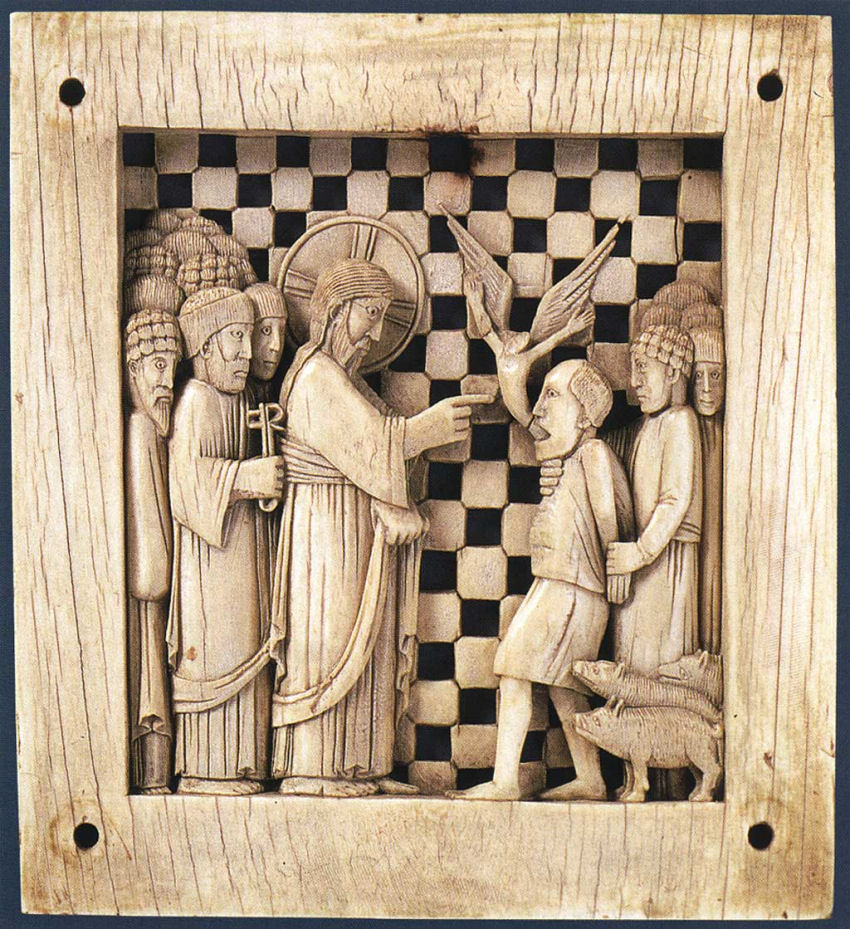
The Gerasene demoniac
from the Madeburg Ivories
Milan, 10th century
They came to the other side of the sea, to the country of the Ger′asenes. And when he had come out of the boat, there met him out of the tombs a man with an unclean spirit, who lived among the tombs; and no one could bind him any more, even with a chain; for he had often been bound with fetters and chains, but the chains he wrenched apart, and the fetters he broke in pieces; and no one had the strength to subdue him. Night and day among the tombs and on the mountains he was always crying out, and bruising himself with stones. And when he saw Jesus from afar, he ran and worshiped him; and crying out with a loud voice, he said, “What have you to do with me, Jesus, Son of the Most High God? I adjure you by God, do not torment me.” For he had said to him, “Come out of the man, you unclean spirit!” And Jesus asked him, “What is your name?” He replied, “My name is Legion; for we are many.” And he begged him eagerly not to send them out of the country. Now a great herd of swine was feeding there on the hillside; and they begged him, “Send us to the swine, let us enter them.” So he gave them leave. And the unclean spirits came out, and entered the swine; and the herd, numbering about two thousand, rushed down the steep bank into the sea, and were drowned in the sea.
The herdsmen fled, and told it in the city and in the country. And people came to see what it was that had happened. And they came to Jesus, and saw the demoniac sitting there, clothed and in his right mind, the man who had had the legion; and they were afraid. And those who had seen it told what had happened to the demoniac and to the swine. And they began to beg Jesus to depart from their neighborhood. And as he was getting into the boat, the man who had been possessed with demons begged him that he might be with him. But he refused, and said to him, “Go home to your friends, and tell them how much the Lord has done for you, and how he has had mercy on you.” And he went away and began to proclaim in the Decap′olis how much Jesus had done for him; and all men marveled.
–Mark 5:1-20
This morning I read again the story of the Gerasene Demoniac and thought, as I often do, about the pigs. I pity those pigs. They never knew what hit them, but it was so terrible and so terrifying that they rushed into the sea to make it stop.
Why would Jesus do that to pigs? Why not just cast out the demons? Was it a trick? A way to destroy the unclean spirits at the expense of the swine? It’s an unsettling idea—so much collateral damage—and so this morning I pondered the demons and the swine.
“I adjure you by God, do not torment me” …And he begged him eagerly not to send them out of the country.
It’s difficult to read about a demoniac and unclean spirits without an overlay of modern medical thinking, but if I stay within the context of the story, then I ask myself, what would torment a spirit? Why do they beg to enter the swine? Do they fear disembodiment? Could it be that unclean spirits seek a home of sorts? Is this why the story takes place among graves?
I thought about all the ghost stories in human cultures; about spirits in torment; I thought about the Dead Men of Dunharrow from The Lord of the Rings–another fearsome Legion. And it seemed to me that permitting the unclean spirits to enter the unclean animals was appropriate. And that death in this case might be a sort of mercy, a laying to rest, a burial in the bodies of creatures that I knew were raised to be killed.
There is much violence and fear in this story. The cost of this healing is high. But in the end, the man who lived among the tombs is returned to life with his friends (does he still have friends?) and the legion who filled him are buried at last. Perhaps in this way the lives of the pigs are not wasted, but are accepted as a sort of sacrifice. I don’t know, but I wonder.
“Go home to your friends, and tell them how much the Lord has done for you, and how he has had mercy on you.”…and all men marveled.


